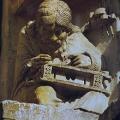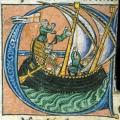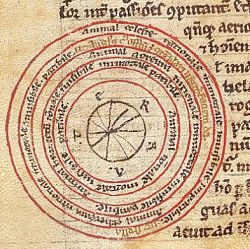214. The Good Book: Philosophy of Nature
As early medieval science blossoms, Bernard Silvestris and Alan of Lille personify Nature in their philosophical prose-poems.
Themes:
• W. Wetherbee, The Cosmographia of Bernardus Silvestris (New York: 1973).
• J.J. Sheridan, Alan of Lille: The Plaint of Nature (Toronto: 1980).
• W. Wetherbee (trans.), Alan of Lille: Literary Works (Cambridge MA: 2013).
Online translation of Alan of Lille’s Complaint of Nature
• B.K. Balint, Ordering Chaos: the Self and the Cosmos in Twelfth-Century Latin Prosimetrum (Leiden: 2009).
• C. Burnett, “Scientific Speculations,” in P. Dronke (ed.) A History of Twelfth-Century Western Philosophy (Cambridge: 1988), 151-76.
• P. Dronke, Fabula: Explorations into the Uses of Myth in Medieval Platonism (Leiden: 1974).
• G.D. Economou, The Goddess Natura in Medieval Literature (Cambridge, MA: 1972).
• G.R. Evans, Alan of Lille: the Frontiers of Theology in the Later Twelfth Century (Cambridge: 1983).
• T. Silverstein, “The Fabulous Cosmogony of Bernardus Silvestris,” Modern Philology 46 (1948-49), 92-116.
• A. Speer, “The Discovery of Nature: the Contribution of the Chartrians to Twelfth-Century Attempts to Found a Scientia Naturalis,” Traditio 52 (1997), 135-51.
• B. Stock, Myth and Science in the Twelfth Century: a Study of Bernard Silvester (Princeton: 1972).







Comments
The Book of Nature
Peter,
Excellent episode--one of my abiding intellectual interests, the concept of the Book of Nature and how it touches upon theology, science and even the visual arts (on the latter, thinking of the later Romantic movement's adulation of nature and the love of organic form).
The bibliography will be most helpful. A question: you've noted that the concept of the Book of Nature goes back to Antiquity, and this is what I'm wanting to know more about: where to we see the idea begin or fully constellate and who might be the great names associated with it (the Greek classical period? Plato? Aristotle?--or might it date back to the Archaic era's natural philosophers?)? And then I would be interested in its passing to Early Christianity
(My ultimate motivation here is linking all this to the rise of modern science--thinking of Peter Harrison's book The Bible, Protestantism and the Rise of Natural Science, where the Reformational traditon essentially rejects the whole idea of the Book of Nature so the Bible could be the only authoritative Book / Text in understanding the world [incl. the turning to greater historical literalism of its stories]. This, in turn, then creates the space for a more scientific, mechanical understanding of nature, over its more humanistic, allegorical interpretations tha tis the Book of Nature.)
While I presume that several sources listed might have brief intro. accounts of this, any further more fully introductory sources you know of would be great.
Thanks!
Rhys
OKC, OK
In reply to The Book of Nature by Rhys William Roark
Book of nature
I looked into that a bit for the episode and though I can't claim to know for sure it looks like the first author to use the metaphor in a significant way may have been Augustine. In any case he was surely a chief source if not the key source for Latin medieval authors. Beyond the reading suggested above there is also this collection which is a bit more scholarly (and is based on a conference I attended as a young whippersnapper):
The Book of Nature in Antiquity and the Middle Ages
In reply to Book of nature by Peter Adamson
The Book of Nature
Peter,
This looks great--scholarly is good. Shall begin to give it a look.
Interesting that while the Greeks may be the intellectual background for this, it is Christianity that gives it its name.
Thank you much!
Rhys
In reply to Book of nature by Peter Adamson
origins of Book of Nature metaphor
Dear Peter and Rhys,
The metaphor of the Book of Nature plays a large role in the poetry of St Ephraim the Syrian, juxtaposed with the Book of Scripture as two complementary avenues to knowledge of God. It may go back to Origen in the Greek world -- it is certainly used by Maximus the Confessor in the seventh century, and may have come to him directly from Origen or via the Cappadocian father Gregory the Theologian. Eriugena could have gotten it from Maximus -- although he also could have taken it directly from Augustine -- and then transmitted it to later centuries in the West. I am not expert on Origen, but it seems that Harrison's book that was mentioned in a previous comment deals with him a little. For Ephraim's idea, you can check the wonderful little volume by Sebastian Brock, The Luminous Eye: The Spiritual World Vision of Saint Ephrem the Syrian.
Nick
Add new comment